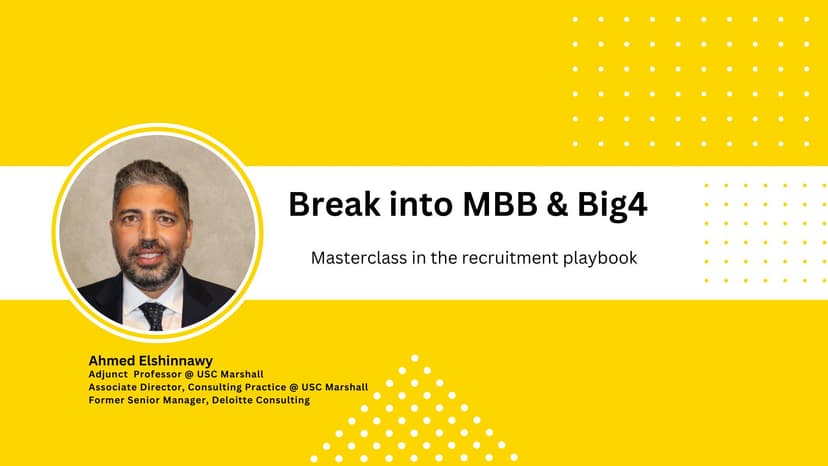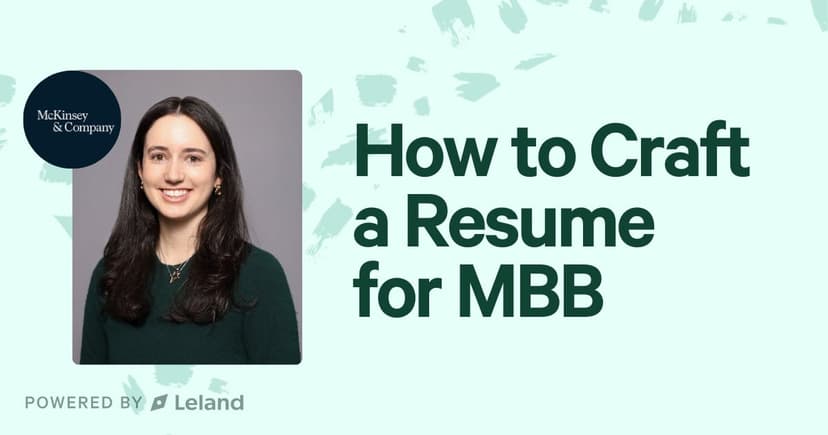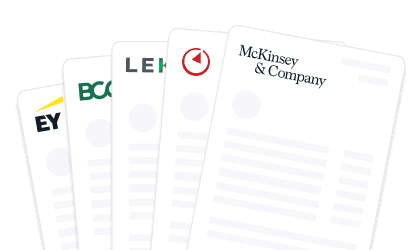Consulting Recruiting Timeline 2025: Key Dates, Deadlines & Prep Tips
Plan your path to MBB and beyond with this complete 2025–2026 consulting recruiting timeline—deadlines, strategies, and expert prep tips.
Posted February 5, 2026

Join a free event
Learn from top coaches and industry experts in live, interactive sessions you can join for free.
Table of Contents
Want to land a consulting job in 2025? The consulting recruiting timeline moves fast—and if you're not planning ahead, you're already behind. From early networking to final interviews, top consulting firms like McKinsey, BCG, and Bain recruit across a tight seasonal schedule that varies by candidate type, school, and region.
This expert-backed guide covers firm-specific application deadlines for full-time and internship roles, how timelines differ by background (undergrad, MBA, APD, experienced hire), and early-access and diversity programs to watch. Also, we’ll walk you through key dates across the summer, fall semester, and early October, and how to prepare and stand out in a competitive cycle.
Whether you're a college junior, an MBA student, or an experienced professional, this article will help you create a clear plan to navigate recruiting season with confidence.
Read: What is Management Consulting? and How to Succeed in a Consulting Career - An Expert Coach's Guide
What Is the Consulting Recruiting Timeline?
The consulting recruiting timeline refers to the structured hiring periods when consulting firms evaluate and hire candidates for full-time positions and consulting internships. It includes several stages: early networking, resume drops, application submissions, first- and second-round interviews, and full-time offer decisions.
While some firms (especially boutique firms) and experienced hire roles operate on rolling timelines, the majority of structured recruiting follows this pattern:
- Networking: January - May
- Applications open: June - August
- Deadlines: July - September
- Interviews: August - early October
- Offers: September - November
Note: Deadlines can differ by school, office, and candidate background, so always verify on your school's job board or the firm's website.
2025–2026 Consulting Recruiting Timeline Overview
| Phase | Undergrad (MBB) | MBA (MBB) | Undergrad (Tier 2) | MBA (Tier 2) |
|---|---|---|---|---|
| Networking Begins | Jan–Mar 2025 | Jan–Apr 2025 | Feb–May 2025 | Feb–May 2025 |
| Applications Open | June–July 2025 | June–July 2025 | July–Aug 2025 | July–Aug 2025 |
| Resume Drops / Application Deadlines | July–mid Aug 2025 | Early–mid Sept 2025 | Mid–late Aug 2025 | Aug–Sept 2025 |
| First-Round Interviews | Aug–Sept 2025 | Sept–October 2025 | Sept–October 2025 | Sept–October 2025 |
| Final-Round Interviews | Sept–October 2025 | October–Nov 2025 | October–Nov 2025 | October–Nov 2025 |
| Offers Extended | Sept–Oct 2025 | Oct–Nov 2025 | Oct–Nov 2025 | Oct–Nov 2025 |
| Offer Deadlines | ~1–2 weeks after offer | ~1 week after offer | ~1–2 weeks | ~1–2 weeks |
| Start Dates | Summer 2026 | Summer 2026 | Summer 2026 | Summer 2026 |
Note: Always verify specific deadlines for your program and school.
Firm-by-Firm Consulting Application Deadlines (2025–2026)
These are the most recent deadlines for top consulting firms in the U.S., updated for the 2025 cycle. Dates may vary by school, so double-check on Handshake or school-specific job boards.
Undergraduate & Master’s Candidates
| Firm | Role | Application Deadline |
|---|---|---|
| McKinsey | Business Analyst | July 10, 2025 |
| McKinsey | Summer Business Analyst Intern | July 17, 2025 |
| BCG | Associate | July 14, 2025 |
| BCG | Summer Associate Intern | June 23 (priority), Sept 3 (final) |
| Bain | Associate Consultant | July 6 & Sept 2, 2025 |
| Bain | AC Intern | July 6 & Sept 2, 2025 |
| Oliver Wyman | Entry-Level Consultant | June 22, 2025 |
| Oliver Wyman | Summer Intern | May 11, 2025 |
MBA Candidates (2Y & 1Y)
| Firm | Role | Application Deadline |
|---|---|---|
| McKinsey | Associate (Post-MBA) | Sept 4, 2025 (confirmed) |
| BCG | Consultant | Estimated Sept 2025 |
| Bain | Consultant | Estimated Sept 2025 |
| Strategy& | Summer Intern | Rolling |
| PwC | MBA Full-Time | Rolling / TBD |
| Simon-Kucher | Summer Intern | Expected Nov 2025 |
PhD, JD, MD Candidates (APD)
| Firm | Role | Deadline |
|---|---|---|
| McKinsey | Associate (APD) | Sept 4, 2025 |
| Bain | Advanced Degree Roles | August 2025 (estimated) |
| BCG | APD / Bridge to BCG | April–June 2026 (estimated) |
| ClearView | Life Sciences Analyst | Feb–Mar 2026 (rolling) |
| L.E.K. | APD Track | TBD |
Experienced Hire Candidates
| Firm | Role | Application Deadline |
|---|---|---|
| McKinsey | Transformation / Exp. Hire | Rolling |
| BCG | Experienced Consultant | Rolling |
| Bain | Lead to Inspire (Women) | March 16, 2025 |
| Putnam | Associate Consultant | Rolling |
| Simon-Kucher | Healthcare Roles | Rolling |
What Should Experienced Hires Know About Consulting Deadlines?
Experienced hire recruiting runs on rolling deadlines, meaning applications are accepted and reviewed year-round. Unlike campus recruiting, which follows a predictable calendar, experienced hire roles open based on office needs, client demand, and specific industry expertise.
These positions often target professionals from finance, tech, healthcare, or operations backgrounds who can contribute immediately to client engagements. Because competition is fierce and openings are limited, success depends on preparation and timing, not just credentials.
Expert Tips for Experienced Hire Applicants
- Stay active year-round. Keep materials sharp and stay alert for openings across multiple industries.
- Leverage your network. Most experienced candidates get interviews through referrals from consultants or managers inside the firm.
- Apply quickly once roles appear. Even if the posting lists no end date, positions can close in weeks.
- Tailor your story. Emphasize transferable skills, leadership, and measurable results from your previous clients or teams.
“Rolling recruiting rewards the prepared. The best candidates treat their job search as ongoing business development — always ready to pitch their story.” — Ex-McKinsey Engagement Manager
Read: How to Become a Management Consultant: Timeline, Requirements, & Tips
What Do Rolling Consulting Application Deadlines Mean?
Rolling consulting application deadlines mean firms evaluate and hire candidates as soon as applications are received, rather than waiting for a single cutoff date. Positions often close once headcount targets are met, making timing and readiness your biggest advantages.
In practice, this model is most common for experienced hires, specialized consulting roles, and smaller or boutique firms. Instead of a clear “apply by” date, firms open applications when they need talent and close them quietly once offers are accepted. That flexibility can help you, but only if you’re prepared before roles go live.
Expert Tips for Navigating Rolling Deadlines
- Apply early. Don’t wait until the last week; firms may fill spots within days.
- Stay ready year-round. Keep your resume, LinkedIn, and cover letter updated so you can apply the moment a role appears.
- Monitor firm websites and Handshake to verify when new postings go live.
- Network regularly. Relationships with consultants and recruiters often reveal openings before they’re public
Pro insight: “In rolling recruiting, the clock starts the moment a posting goes live. Top candidates are usually interviewed within a week.” — Former BCG Recruiting Manager
Rolling deadlines give you freedom, but also more competition. Think of them as a continuous race. One where being prepared first matters far more than being perfect later.
What Are Boutique Consulting Firm Deadlines This Year?
For the 2025–2026 cycle, boutique consulting firm deadlines typically fall between August and October for undergraduates and MBAs, while experienced hires see rolling applications year-round. Advanced degree timelines tend to stretch into late summer or early fall, depending on firm size and region.
Boutique firms like L.E.K. Consulting, Oliver Wyman, Bridgespan, Simon-Kucher, and Putnam Associates often mirror MBB’s cadence but with subtle variations. Some close earlier to compete for talent; others accept applications later to capture strong candidates who missed MBB or Big 4 deadlines.
Typical Boutique Consulting Recruiting Deadlines
| Candidate Group | Common Deadline Window | Notes |
|---|---|---|
| Undergraduates / MS | August–September | Aligns with campus recruiting; early submission highly recommended |
| MBAs | September–October | Mix of internship and full-time recruiting; often office-specific |
| Advanced Degrees (PhD, JD, MD) | Summer–Fall | Programs are less standardized; check each region’s calendar |
| Experienced Hires | Rolling / Year-round | Apply immediately; roles close quickly once filled |
Note: Always confirm exact dates on each firm’s careers page or your university’s job portal. Boutique firms post fewer openings, so your timing and networking often determine whether you’re even considered
How Do International Consulting Application Deadlines Differ?
International consulting deadlines vary significantly by geography, shaped by regional university calendars, visa timelines, and office hiring needs.
- Europe: Recruiting tends to start earlier in the fall (July–September), especially for London, Paris, and Germany offices. MBA and internship applications often close by early October.
- Asia-Pacific: Highly variable. Offices in Singapore, Hong Kong, and Australia may open applications as early as March–April, while others follow U.S. or U.K. timelines.
- Canada: Largely mirrors the U.S. cycle, with undergrad applications due in July–August and MBAs recruiting through October. Some firms add winter co-op programs in January.
Pro tip: Many international offices recruit independently from U.S. headquarters. Always check each region’s website or Handshake postings and verify whether your target office has separate cycles.
Because international recruiting depends on local academic calendars and demand, proactive candidates gain an edge by networking early, monitoring firm portals, and reaching out directly to recruiters.
The Full Timeline Prep: From Early Prep to Final Offer
12+ Months Before: Get Oriented and Start Networking
The most successful candidates don’t wait for applications to open; they start preparing a full year in advance. At this stage, your focus should be on understanding the consulting industry, researching top firms, and identifying which ones align with your background, goals, and interests.
Start attending info sessions, alumni panels, and networking events to hear directly from consultants and recruiters. These early interactions not only give you insights into firm culture and recruiting expectations, but also help you get on recruiters’ radar before the rush begins.
Read: How to Network for Consulting
6–9 Months Before: Applications Open and Strategy Locks In
This is when applications for full-time roles and internships start to open. Most consulting firms release them in waves throughout the summer, especially in June, July, and August, depending on your school and background.
Now is the time to polish your resume and LinkedIn, craft tailored application materials for each firm, and attend firm-specific webinars or recruiting events. Make sure you have a shortlist of firms you're applying to and know which roles fit your experience level. If you're applying to multiple offices or roles, keep a careful track of varying deadlines.
Interview Prep Season: What to Expect
Consulting interviews are known for their rigor and structure. You can expect two to three rounds, with most interviews starting in August and wrapping up by October. The first round often includes one or two case interviews and a behavioral component; final rounds usually involve more senior interviewers and higher-stakes problem-solving.
Practicing cases with peers, doing mock interviews, and completing and refining your personal story should all be part of your prep during this phase. If you're not sure where to start, working with an expert coach can help you structure your practice and build confidence.
Read: Consulting Case Interview Guide – With Examples
Offer Timelines and Exploding Deadlines
Once interviews conclude, firms typically extend offers quickly, sometimes within a day or two. But be aware: many of these offers come with short acceptance windows, often one to two weeks. Some firms use “exploding offers,” which means that if you don’t respond by the deadline, the offer is withdrawn.
This pressure is especially common with MBB firms and top target schools, so it’s important to have a game plan before your interviews begin. Know how you'll evaluate offers, who you'll talk to for guidance, and what your priorities are.
Early Recruiting, Diversity Programs, and Accelerated Timelines
Top consulting firms run early-access and diversity programs to build relationships with high-potential students, well before the formal application cycle begins. These programs often lead to accelerated interviews, exclusive prep resources, and even early internship offers.
Here’s a snapshot of the most prominent programs:
| Firm | Program Name | Target Audience | Deadline (2025–2026 Cycle) | Fast-Track to Internship? |
|---|---|---|---|---|
| McKinsey | Sophomore Summer Business Analyst (SSBA) | Sophomore URM undergrads | June 10, 2025 (confirmed) | Yes |
| Bain | Building Entrepreneurial Leaders (BEL) | Black, Hispanic/Latinx, and Indigenous sophomores | Estimated: Feb–Mar 2026 | Yes |
| BCG | Empower / Advance / Grow / Unlock | URM sophomores (Grow), women (Advance), pre-MBAs | May 12, 2025 (Unlock for Empower) Estimated: March–May 2026 for others | Yes |
| Deloitte | Women’s Leadership Launch | First-year MBA women | Estimated: Fall 2025 | Yes |
| Deloitte | Discovery Internship | Undergrad sophomores | Rolling | Yes |
| Strategy& | Diversity Programs (varies by office) | URM undergrad/MBA candidates | Estimated: Spring 2026 | Case-by-case |
| PwC | Career Preview, Destination CPA | Freshmen/sophomores (diversity focus) | Estimated: March–Nov 2025 | Often |
Why Apply?
These programs are more than just resume builders because they often include:
- Early exposure to the consulting recruiting process
- Mentorship from current consultants
- Invite-only case workshops and prep events
- Interview for tracking or exclusive internship opportunities
They are also highly competitive. Some firms report acceptance rates as low as 5–10%, similar to full-time roles.
When to Apply for Consulting Internships (2025–2026)
The best time to apply for consulting internships is between June and September, the year before your intended internship start date, typically the summer before your junior or penultimate year. But the exact dates vary significantly by firm, school, and role. Here's what top coaches and ex-consultants recommend based on your background:
Undergraduate Students (BA/BS & Master’s-Level)
Target timeline: June–August 2025 for summer 2026 internships
Key firms with early cycles: McKinsey, BCG, Bain, and Oliver Wyman typically open applications in mid-June and close them by late July or early September
Campus recruiting: At target schools, resume drops often happen via school job portals (e.g., Handshake) in early August, with interviews beginning by late August or early October
Pro tip: Apply as soon as applications open—even if deadlines are in September. Firms often review on a rolling basis, and early submissions signal a strong interest.
MBA Students (1Y and 2Y Programs)
Target timeline: July–September 2025
Top firms start opening roles for summer internships right after orientation for first-years. Some pre-MBA programs (like Deloitte’s Women’s Leadership Launch) even begin before the fall semester starts.
Pro tip: Begin drafting your applications during the summer, before classes start. Balancing coursework, networking, and casing is much easier with your materials done early.
International Applicants
Deadlines for consulting internships outside the U.S. often follow a different rhythm. For example, Bain Southeast Asia and BCG Singapore may recruit in September–November for internships the following year.
Pro Tip: Always check regional firm sites or connect with local recruiters to verify timing.
Sophomore & Diversity Internship Programs
Early deadlines: Programs like McKinsey’s SSBA, BCG Grow, and Bain’s BEL often have deadlines as early as May–June of your sophomore year.
Why apply: These roles often lead to fast-tracked interviews for junior-year internships or even full-time opportunities.
Pro Tips to Stay Ahead of the Curve
Start early and build relationships over time.
If there’s one thing top candidates have in common, it’s that they don’t wait until applications open to get started. The most successful applicants begin their prep 9 to 12 months in advance, well before resume drops or interview invites. This gives you time to research firms, understand their unique values, and build relationships through informal conversations. Reach out to alumni, attend campus events, and sign up for firm newsletters to stay in the loop on timelines and opportunities.
See our package to effectively land a top consulting interview here.
Make the most of firm events and coffee chats.
Events hosted by consulting firms, both virtual and on campus, are designed to help you connect with recruiters and consultants. But showing up isn’t enough. Come prepared with thoughtful questions, follow up with a thank-you note, and stay engaged throughout the recruiting cycle. These conversations not only build your confidence but can also lead to referrals or interview invitations.
Read: Consulting Coffee Chats: The Ultimate Guide
Practice case interviews like it’s a skill, not a test.
Consulting interviews are like a sport; you get better with deliberate practice. The top firms expect polished case performance, structured communication, and confident problem-solving. Start with frameworks, but don’t rely on memorization alone. Practice with peers, record yourself, and consider doing live mocks with a coach who can give you tailored feedback on both content and delivery.
Read: 50+ Case Interview Questions and Examples From Top Firms
Create a structured prep plan.
Don’t leave your recruiting success to chance. Build a clear prep timeline with milestones: when to finalize your resume, when to start applications, how many cases to practice per week, and when to schedule mocks. Having a plan keeps you focused and reduces the last-minute scramble that sinks many otherwise strong candidates.
Keep track of shifting deadlines.
Application deadlines vary by firm, office, and school, and some change year to year. Many consulting firms don’t post their dates publicly, or they update them last minute through school portals like Handshake. Create a personal deadline tracker so nothing slips through the cracks. Mark down resume drops, info sessions, interview dates, and response windows. Staying organized gives you a competitive edge in a fast-moving process.
Pro tip: Create a deadline tracker. Many firms don’t advertise widely, and dates shift by school.
Read: Consulting Deadlines: Complete Timeline for MBB + Top Firms
What If You Miss a Consulting Application Deadline?
Missing a consulting application deadline isn’t the end; it’s a strategic pivot point. Many top candidates, including those who eventually land MBB offers, miss early cycles but come back stronger by using the time to upgrade their candidacy. Instead of scrambling, start by identifying firms with rolling deadlines or boutique consultancies that recruit later into the fall semester or reopen in the spring.
International offices may also have staggered timelines worth exploring. Next, shift focus to skill-building: strengthen your resume with quantifiable impact, sharpen your case interview skills, and deepen your networking through informational chats and alumni referrals. Treat the extra months as a chance to build momentum, not as lost ground.
When the next cycle opens, you’ll be a more polished, proactive, and compelling candidate. As one former Bain interviewer puts it: “A missed deadline isn’t a failure — it’s feedback. The strongest applicants often succeed because they took the time to refine their story and come back as undeniable hires.”
The Bottom Line
The consulting recruiting timeline moves quickly, and those who start late rarely catch up. Begin preparing 6–12 months in advance to stay ahead of shifting deadlines, firm events, and interview windows. If you’re serious about landing an offer, don’t wait to request expert guidance.
Want to make sure you don’t miss a deadline or a prep window? Book a 1:1 session with a top management consulting coach to build your strategy. Still have more questions about your timeline or target firms? Explore management consulting bootcamps and free events made to help you build a confident, strategic path to your consulting career.
See: The 10 Best Consulting Coaches for Case Interviews & Resumes
For more helpful advice on all aspects of the world of management consulting, read our articles:
- From No Offers to Multiple Offers–How to Take Your Casing to the Next Level
- Top 5 Tips on Breaking Into Consulting (From an Ex-Bain Interviewer)
- How to Prepare For Your Management Consulting Interview
- How to Answer "Tell Me About Yourself" in Consulting Interviews
- Top 10 Questions to Ask in a Consulting Interview
- How to Ask Clarifying Questions in Your Consulting Case Interview
FAQs
How early should I start preparing for consulting recruiting?
- Ideally, 9–12 months in advance. This includes building relationships, understanding firms, and preparing for interviews.
What if I miss a deadline?
- Some firms offer rolling or off-cycle options, but the best opportunities are early. Don’t wait. Follow up with recruiters and check if late submissions are accepted.
Can I apply to multiple offices within the same firm?
- Yes, but typically you'll rank preferences, and one will lead your process. Rules vary; verify with each firm.
Do firms still host virtual events?
- Yes. Many have hybrid models, so you can attend campus or online sessions. Virtual access is great for non-target schools.
What’s the difference between full-time roles, full-time positions, and full-time opportunities?
- They're often used interchangeably, but check role descriptions. Some internships lead directly to full-time offers.

































